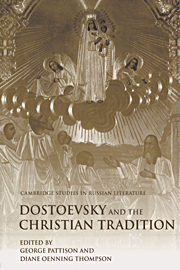Book contents
- Frontmatter
- Contents
- Notes on contributors
- Acknowledgments
- Notes on conventions and abbreviations
- Introduction: Reading Dostoevsky religiously
- PART I DOSTOEVSKY AND THE PRACTICE OF ORTHODOXY
- PART II DOSTOEVSKY AND CHRISTIAN THEOLOGY
- PART III READING DOSTOEVSKY RELIGIOUSLY: CASE STUDIES
- 9 Towards an iconography of Crime and Punishment
- 10 Pavel Smerdyakov and Ivan Karamazov: The problem of temptation
- 11 Beyond the will: Humiliation as Christian necessity in Crime and Punishment
- 12 Freedom's dangerous dialogue: reading Dostoevsky and Kierkegaard together
- Bibliography
- Index
- CAMBRIDGE STUDIES IN RUSSIAN LITERATURE
12 - Freedom's dangerous dialogue: reading Dostoevsky and Kierkegaard together
Published online by Cambridge University Press: 02 December 2009
- Frontmatter
- Contents
- Notes on contributors
- Acknowledgments
- Notes on conventions and abbreviations
- Introduction: Reading Dostoevsky religiously
- PART I DOSTOEVSKY AND THE PRACTICE OF ORTHODOXY
- PART II DOSTOEVSKY AND CHRISTIAN THEOLOGY
- PART III READING DOSTOEVSKY RELIGIOUSLY: CASE STUDIES
- 9 Towards an iconography of Crime and Punishment
- 10 Pavel Smerdyakov and Ivan Karamazov: The problem of temptation
- 11 Beyond the will: Humiliation as Christian necessity in Crime and Punishment
- 12 Freedom's dangerous dialogue: reading Dostoevsky and Kierkegaard together
- Bibliography
- Index
- CAMBRIDGE STUDIES IN RUSSIAN LITERATURE
Summary
In the days when existentialism was fashionable, the names of Kierkegaard, Dostoevsky and Nietzsche were frequently linked as the three great nineteenth-century precursors of existentialist thought. In contrast to Nietzsche, Kierkegaard and Dostoevsky had one further element in common: that they were both Christian writers. They could therefore serve both to illustrate the extent – I think the enormous extent – to which religious concerns were central to existentialism and how faith could respond to the challenge posed by existentialism that, in the popular imagination at least, was strongly identified with the atheism of Nietzsche, Sartre and (many claimed) Heidegger. Nor were Kierkegaard and Dostoevsky thought of merely as two separate historical sources of subsequent intellectual development. Again and again we find them virtually identified as saying essentially the same thing. I shall therefore begin by taking three examples of writers who, from distinct but not unrelated perspectives, saw them as being joined in this way.
Karl Barth's commentary on St Paul's Letter to the Romans was one of the defining works of European intellectual life in the 1920s. In the preface to the second edition of this commentary, Barth lists the most significant areas of difference between this and the first edition. Amongst these he mentions the influence of ‘what may be culled from the writings of Kierkegaard and Dostoevsky that is of importance for the study of the New Testament’. The importance of this ‘culling’ may be deduced from a further comment in the same preface, when he says: ‘… if I have a system, it is limited to a recognition of what Kierkegaard calls the “infinite qualitative distinction” between time and eternity …’
- Type
- Chapter
- Information
- Dostoevsky and the Christian Tradition , pp. 237 - 256Publisher: Cambridge University PressPrint publication year: 2001
- 1
- Cited by



